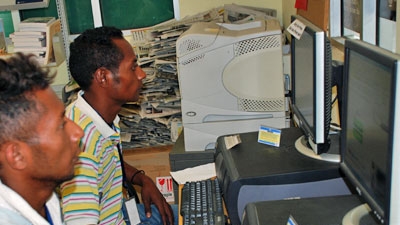Dili, 20 Dec 2012 - Access to mobile phones and internet in Timor-Leste has been increasing in the past year, but is still relatively limited and expensive for the majority of the people, especially in rural areas. In 2011 the Government took the decision to liberalize the telecommunications sector, to allow more companies to enter the market and renegotiate the exclusive concession contract with Timor Telecom. The World Bank provided advisory assistance on telecommunications policy and new legislation.
Two new telecommunication companies have been licensed are expected to start operations in the first quarter of 2013 to help increase services at a cheaper price. By mid-2013 telecom networks in Timor-Leste should reach 90 percent of the country’s population, and services should become more varied and affordable for the majority of the population.
Telecommunications services currently limited and expensive
Since 2002, Timor-Leste only has one telecommunication company, Timor-Telecom. This had its consequences: high transaction cost for the Timorese people and businesses, missed opportunities, long travel times on poor roads and seclusion of many rural communities.
Most landline connections that existed before Timor-Leste’s independence were destroyed post-referendum, so the role of mobile phones is vital. However, roughly only 50 percent of the population have access to mobile phones and over two thirds of them live in the capital, Dili. The vast majority of people living in rural areas are not connected due to high costs and lack of service.
The cost of using the internet is also very expensive. A 256 kbps fixed broadband connection costs $300/month or $3,100/month for unlimited access and high speed*. These prices are high by any international standard, let alone in a less developed country like Timor-Leste. Price levels partly reflect the cost of providing service (including the cost of international satellite bandwidth), but also the previous monopolistic market structure.
Another important aspect of the telecoms/ICT sector reforms will be the establishment of an independent Regulator, Autoridade Nacional de Comunicacoes. The ANC will be mandated to ensure competitive practice by the operators, compliance with new regulations typical for a competitive market with multiple service providers, and to develop a program to support universal access in commercially less viable areas of the country.
Better telecommunications helps build a stronger, more connected economy
Improved access to telecommunications is likely to benefit many aspects of the economy. Agriculture has great potential in Timor-Leste, particularly coffee. Around 27 percent of the population, or 29,500 people in Timor-Leste are coffee farmers concentrated in Ermera, Ainaro, Aileu and Bononaro districts . Access to information can help them make better decisions, through information on weather conditions, getting in touch with suppliers, and help sell produce at the best price.
Oscar Sarmento, a coffee farmer in a small village of Aituto in Ainaro District, is among the few farmers who have benefitted from mobile phones. It costs $10 per person to travel from Maubisse to Dili, a huge cost in Timor-Leste. Communicating via mobile phone significantly reduces this burden.
“After the harvest, I call the buyers in Dili and let them know about our coffee to negotiate the price. We can wait for them to come and pick up the coffee”, explained Oscar. “This is more convenient and cheaper for us because we don't have to travel all the way to Dili” he continued.
Other developing countries already use mobile phones in many ways: for making payments, buying goods, and sending money home to families for overseas workers.All of this could hold true for Timor-Leste, with the added potential for new jobs ranging from high skilled employment like engineers, to people selling phone credits.
Improved social communication and information
Laurentino Fatima Magno, a university student at Universidade da Paz, is from the District of Ainaro. His parents live in a rural area and he uses a mobile phone to stay in touch with his family there.
“It is very expensive for those of us from the districts. For the price of $2, I can’t talk for 10 minutes and the connection to my hometown is bad”, said Laurentimo. For people living with less than $1 a day, this is very expensive.
The cost of sending an SMS in Timor-Leste costs 8 cents within the country and 18 to 20 cents to send a message abroad. This is higher compared to the cost in other countries. In neighboring Indonesia, for example, sending an SMS costs 1 cent within the country and 6 cents to send an SMS abroad, including Timor-Leste.
Recent tension during the post-general election in Timor-Leste is a reminder of the importance of good telecommunications infrastructure. People depended on SMS to avoid being injured when people started throwing rocks. Notifications were received hours after they were sent by the UN. With limited bandwidth, many text messages were held up in the system. Better service quality will improve the ability of systems to handle such critical flows of information.
The World Bank is supporting telecommunications reform in Timor-Leste
Alongside other development partners, governments and private sector, the World Bank has been a passionate advocate for telecommunications reform in Timor-Leste and in the whole Pacific region, where over two million more people now have access to mobile phones.
At the request of the Government of Timor-Leste, the World Bank provided technical support on how to improve telecommunications access, particularly to make phone calls and internet access more widely available and less expensive through fair and regulated competition. The Bank provided support by advising the Government on a new telecommunications policy, which was approved by the Council of Ministers in 2011.
In the future, the World Bank, through a partnership program with AusAID currently under discussion, has been requested to provide support to the ANC and to the Ministry of Transport and Communication’s ICT policy unit , to help ensure that people of Timor-Leste can alse benefit from improved telecommunications services.
* The article has been amended to reflect current prices as of January 2013.

